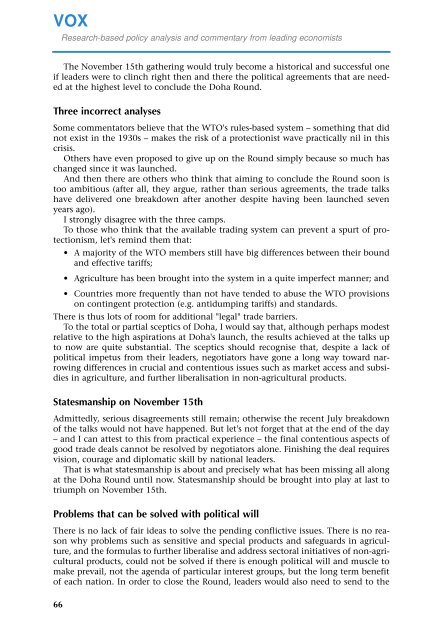What G20 Leaders Must Do To Stabilise our Economy and Fix ... - Vox
What G20 Leaders Must Do To Stabilise our Economy and Fix ... - Vox
What G20 Leaders Must Do To Stabilise our Economy and Fix ... - Vox
Create successful ePaper yourself
Turn your PDF publications into a flip-book with our unique Google optimized e-Paper software.
VOXResearch-based policy analysis <strong>and</strong> commentary from leading economistsThe November 15th gathering would truly become a historical <strong>and</strong> successful oneif leaders were to clinch right then <strong>and</strong> there the political agreements that are neededat the highest level to conclude the <strong>Do</strong>ha Round.Three incorrect analysesSome commentators believe that the WTO's rules-based system – something that didnot exist in the 1930s – makes the risk of a protectionist wave practically nil in thiscrisis.Others have even proposed to give up on the Round simply because so much haschanged since it was launched.And then there are others who think that aiming to conclude the Round soon istoo ambitious (after all, they argue, rather than serious agreements, the trade talkshave delivered one breakdown after another despite having been launched sevenyears ago).I strongly disagree with the three camps.<strong>To</strong> those who think that the available trading system can prevent a spurt of protectionism,let's remind them that:• A majority of the WTO members still have big differences between their bound<strong>and</strong> effective tariffs;• Agriculture has been brought into the system in a quite imperfect manner; <strong>and</strong>• Countries more frequently than not have tended to abuse the WTO provisionson contingent protection (e.g. antidumping tariffs) <strong>and</strong> st<strong>and</strong>ards.There is thus lots of room for additional "legal" trade barriers.<strong>To</strong> the total or partial sceptics of <strong>Do</strong>ha, I would say that, although perhaps modestrelative to the high aspirations at <strong>Do</strong>ha's launch, the results achieved at the talks upto now are quite substantial. The sceptics should recognise that, despite a lack ofpolitical impetus from their leaders, negotiators have gone a long way toward narrowingdifferences in crucial <strong>and</strong> contentious issues such as market access <strong>and</strong> subsidiesin agriculture, <strong>and</strong> further liberalisation in non-agricultural products.Statesmanship on November 15thAdmittedly, serious disagreements still remain; otherwise the recent July breakdownof the talks would not have happened. But let's not forget that at the end of the day– <strong>and</strong> I can attest to this from practical experience – the final contentious aspects ofgood trade deals cannot be resolved by negotiators alone. Finishing the deal requiresvision, c<strong>our</strong>age <strong>and</strong> diplomatic skill by national leaders.That is what statesmanship is about <strong>and</strong> precisely what has been missing all alongat the <strong>Do</strong>ha Round until now. Statesmanship should be brought into play at last totriumph on November 15th.Problems that can be solved with political willThere is no lack of fair ideas to solve the pending conflictive issues. There is no reasonwhy problems such as sensitive <strong>and</strong> special products <strong>and</strong> safeguards in agriculture,<strong>and</strong> the formulas to further liberalise <strong>and</strong> address sectoral initiatives of non-agriculturalproducts, could not be solved if there is enough political will <strong>and</strong> muscle tomake prevail, not the agenda of particular interest groups, but the long term benefitof each nation. In order to close the Round, leaders would also need to send to the66














